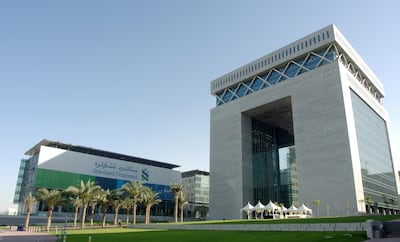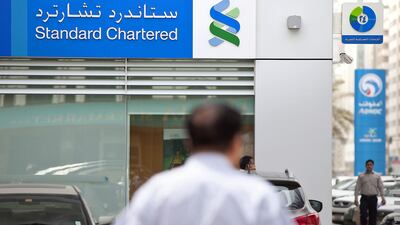British lender Standard Chartered is bullish about the UAE's growth prospects and its broader Middle East and Africa businesses.
The emerging markets-focused lender expects a significantly higher revenue contribution from these markets in the next five years, its chairman said.
The UAE is among the top-five global markets for the London-based bank and the Middle East and Africa region accounted for about 20 per cent of the lender’s revenue in 2021, Jose Vinals told The National.
“For the UAE and the region — Africa and the Middle East — the growth we are envisaging in the next five years is significantly higher than the growth we have had in the past five years,” said Mr Vinals, who visited the Emirates and Saudi Arabia last month.
The lender generates about 70 per cent of its revenue from Asia, 10 per cent from the Middle East, 10 per cent from markets in Africa and the rest from its operations in the US and Europe.
Standard Chartered, which operates in 59 markets, reported a 3.5 per cent jump in its Middle East and Africa revenue to $2.45 billion in 2021, while its operating profit in the region climbed to $856 million, the highest since 2015.
Its UAE operation swung to profitability last year, with operating profit climbing to $242m from a loss of $110m in 2020 at the height of the pandemic.
“We had a very good year but it is something that we are looking to grow. We are very positive on the short- to medium-term outlook of the UAE and also very committed to supporting the country in reaching its growth objectives,” Mr Vinals said.
“The UAE plays a key regional role as a connector of trade and economic vitality and we are a trade bank, so our DNA is very much connected to that of the UAE, and we are benefiting from that.”
Mr Vinals is equally bullish on growing the bank's institutional, advisory and wealth businesses in Saudi Arabia. The lender is also set to open its first fully-fledged branch in Egypt later this year as part of its expansion strategy in Africa.
Standard Chartered expects Asia to remain its main engine of growth this year and next and does not expect an impact on its operations and earnings owing to Russia’s military offensive in Ukraine. The bank does not have operations in Russia or Ukraine and has minimal exposure to clients in these markets.
Mr Vinals does not see a systemic weakness, an impact on earnings or a rise in loan losses in Europe's financial sector, as banks have limited exposure to Russia.
However, he does expect European central banks to follow US Fed monetary tightening policy, set to start later this month, as the continuing geopolitical uncertainty affects the EU more than the US. But European rate decisions are most likely going to be at a slower pace.
“I have no doubt that the path of higher interest rates will still be there. The question is whether we will see … some impact on the speed of interest rate increases,” he said.
“I wouldn’t be surprised if the European central banks still take a gradual exit [path] but a little bit more cautiously than was anticipated by the market before the Ukrainian invasion.”

Mr Vinals expects the US central bank to increase rates six times, or possibly more, at 25 basis points each time, depending on the pace of inflation and other factors this year and next.
The Ukraine-Russian crisis increase uncertainty but there are enough avenues for the world economy to grow as pandemic-related headwinds subside, he said.
“Let’s remember that the pandemic is now much more under control in most parts of the world, [though] there are still some challenges,” Mr Vinals said.
“The fact that economies are still recovering and reaping the benefits of opening up is something that is going to underpin the global growth.”
Growth is more widespread across economies than last year and that puts the global economy on “strong footing” despite the “turbulence we are seeing right now”.
The global economy bounced back strongly in 2021 despite pandemic-driven headwinds and the emergence of new variants of Covid-19 that led to border closures and fresh restriction in countries in Europe and Asia. Those restrictions are now being rolled back and growth momentum has continued this year.
The International Monetary Fund expects global economic output to expand by 4.4 per cent in 2022. This is 0.5 percentage points down on its previous estimates, owing to factors including rising inflation and supply chain disruptions. The fund has given a warning that the Ukraine-Russia crisis will impact global growth.
It remains to be seen if the multiyear highs in oil prices will prove to be a short-term phenomenon, Mr Vinals said.
chairman, Standard Chartered
“The question is whether this is really a temporary situation and [what will be] suppliers' response,” he said, adding that it was in the interest of both oil producing and oil consuming countries to have price stability.
He said he thought that “self-regulating mechanisms” would tame the current high price, as supply adapted to market situations.
Oil prices that increased 67 per cent last year on the back of strong economic recovery and robust demand for crude, have risen sharply in the last few weeks. Brent, the global benchmark for two thirds of the world's oil, rallied 6.9 per cent to $118.11 per barrel at the close of trading on Friday. West Texas Intermediate, the gauge that tracks US crude, was 7.4 per cent higher at $115.68.
That was the highest close for Brent since February 2013 and for WTI since September 2008. Brent hit a record high of $147.02 on July 11, 2008 amid the global financial crisis, while WTI soared to $146.90.
Analysts and market observers expect oil to edge past $130 per barrel if the war in Ukraine drags on.


